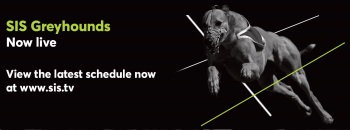“Wimbledon is f****d” said Paschal Taggart earlier this week when hearing of Sadiq Khan’s plans to allow a council/property developer fit-up to achieve its aim.
Most of us would agree – and we need someone to blame.
GRA, Galliard Homes, the GBGB, Clive Feltham, Sadiq Khan, Tom Kelly, Barrie Faulkner, Merton Council, AFC Wimbledon and GRA yet again – perm each of three for a tricast.
But might Paschal have extended his view to ‘Greyhound racing is f****d’?
There is a lot of nodding taking place. The evidence is pretty compelling:
In addition to losing the home of the Greyhound Derby, we could possibly lose half of all our tracks if the BAGS/SIS battle goes septic.
Meanwhile we have record low numbers of owners, trainers, greyhounds and attendances.
We have a governing body not designed or funded to commercially promote the greyhound industry. We have a regulatory board that seems preoccupied by increased, rather than reduced, regulation.
We have a trainers association who are more anti than the most rabid abolitionist – writing to Government about greyhounds being killed, or exported to be killed, with racing authorities involved in a big cover-up.
Meanwhile, the groups that make the most profit from our industry, the bookmakers, are allowed to voluntarily underpay – or in some cases, not pay.
Anyway – while I was checking Amazon for delivery dates and prices on 5,000 rope nooses (waterproof and available in six pastel colours), I came across the works of Friedrich Nietzsche, German philosopher and holding midfielder for FC Dresden (1867-75) – allegedly.
Friedrich tells us “There are no facts, only interpretations.” which sounds like a line I would have used on my mum when she found an empty biscuit tin. But it got me thinking. . .
First lets get the blame thing out of the way. I realise that a large number of people who post on greyhound forums feel they have a right to a facility on which they can indulge their hobby. But their playground is someone else’s business.
Yes you can race on my track – provided I can make money out of you and your dog.
That’s unfair
No its business, go and build your own track!
On a broader outlook, Wimbledon’s demise is just another chapter in greyhound racing’s declining fortunes. It follows, in no particular order, in London alone: White City, Harringay, Hackney, Wembley, Charlton, Park Royal, West Ham, Stamford Bridge, Wandsworth, New Cross, Clapton, Hendon. . .and so on.
For decades Wimbledon made money for the Cearns family until sold onto GRA in the early 1970s. If the Cearns still owned it today, and had an option to make millions in housing development, would they turn it down? Would you?
Let’s continue to play devil’s advocate. If you heard that a new greyhound track was being built but it meant turfing out a failing decrepit football club, what would you do? Bye lads – sorry!
If your savings were invested in Galliard Homes shares and there was a chance to make millions by closing down a local cricket club and building 600 houses on it, would you object?
If Tom Kelly had the power and resources to save Wimbledon, do you not think he would do it? The same goes for the failure so far to reach a deal on internet betting. It’s not through lack of trying.
As for Clive Feltham’s role – would Galliards have closed their tracks so much sooner had he not been able to provide them with rental income as they lined up their rows of ducks?
(In fact, GRA, the original company, hasn’t existed for years, though it is a handy sacred cow for a good kicking.)
As for the business of declining greyhound numbers – surely the upside is less wastage with racing careers now being extended, RGT waiting lists shortened, and an eventual shortage of supply which will lead to long overdue price increases for breeders?
Whichever way I (and Friedrich) view this, you cannot hold an industry together if the only glue is sentiment and enjoyment. Profits pay for the raw materials and the welding.
The big question is then – can greyhound racing ever return as a good investment?
Our detractors would describe an industry that peaked at over 80m annual attendances in the late 1940s and has shown steady decline ever since.
In the intervening years a hundred different developments have lumped or chipped away at attendances: everything from betting shops, to colour TV, to cheap supermarket beer, to satellite TV and the internet.
But I refuse to see all that.
I see us as being well able to compete with two fat blokes in XXXXL shirts (from the bucket-of-sick design range) hurling darts from podgy fingers in front of 10,000 screaming half-tanked nutters – and all screened live on TV with sponsorship.
What can dog tracks learn from Lords where, on a recent Thursday evening, two teams spent three hours slogging through a league game of Twenty-20 in front of a sell out crowd of 28,000 barely knowledgeable cricket fans?
Nobody goes out on Thursday, and you can’t compete with SKY!!
Nobody is about to un-invent betting exchanges, so we will never see 15 bookies at a dog track ever again.
The internet is only going in one direction. So why would you want a stadium that houses 30,000 greyhound fans when comfort for 3,000 and a satellite link is more than adequate?
Don’t mourn it – adapt to it.
What we have is a sport that few know about – even fewer believe in – but that seldom disappoints a virgin customer.
We also have a sport that has just been waiting for modern technology to rescue it.
You can bet and view off your phone or tablet with a couple of clicks. You can make your selection based on a colour, a silly name, or hundreds of lines of form.
Six runners and a chance to play every 15 minutes – not three possible results in three hours or 90 minutes (no wonder they needed to invent in-play).
Paschal Taggart wasn’t looking to build a new Wimbledon as a sentimental gesture. He is a cold nosed businessman. But he is also a would-be investor who believes he has found an old under-exploited or appreciated gold seam that could be transformed by new technology.
Greyhound racing will not benefit from Paschal’s plans, but it desperately needs someone who shares his vision.
The formation of the new GMG group of tracks should provide the resources and drive for original thought about what we have – and where we go with it – if they can buy into that vision.
There is life beyond decline and BAGS dependency. There has to be.













